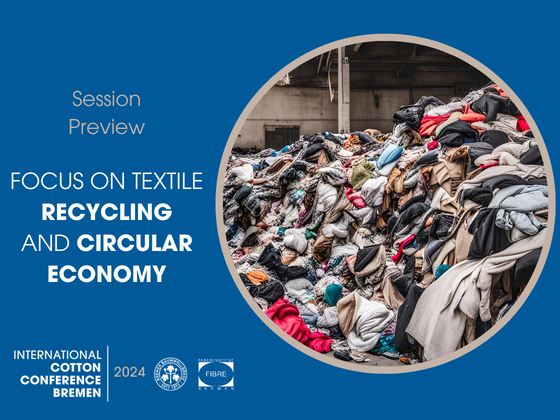One of the most topical highlights of the 37th International Cotton Conference Bremen will be a session analysing the recycling of textiles made of cotton and blended fibres as part of the circular economy.
During the session experts from the supply chain will discuss whether and how the methods can make a productive contribution to the desired climate and resource-friendly economic processes. But is this already possible today at the push of a button? The Cotton Conference provides answers and evaluates tried and tested methods from a technical, economic, and ecological perspective. Find an initial cross-section of topics below.
Increasing sustainability: Turning Recycled Material into Yarn
Silke Huertos-Lopes from the leading globally operating technology company Saurer, Übach-Palenberg, Germany will give an overview of the possibilities of turning recycled material into yarn. Saurer is a specialist company for machinery, components and software to process staple fibres from bale to yarn.
Possibilities and Limitations of Polycotton Recycling
Esther Rohleder from the Niederrhein University of Applied Sciences, Mönchengladbach, Germany, will talk about the possibilities and limitations of recycling. Her focus lies on the recycling of mixed textiles made of polycotton and automated sorting systems required for this. Rohleder is also studying the quality of the resulting fibres and products in her research project.
Optimization of Spinning Preparation Technology for Recycling
Stephan Baz from the DITF – German Institutes of Textile and Fiber Research Denkendorf, Germany, will present results from the research project ‘RezyCard’. The project aims to increase the recycled fibre content of post-consumer cotton textiles in yarn production by up to 50 percent. This requires new approaches in production technology. Existing operating principles are being compared and improved on the key machine for fiber opening in the spinning mill, the card.
Combing & Recycled Ring Yarns
According to Michael Will from the Swiss machine company Rieter AG, Winterthur, the two main challenges in processing mechanically recycled fibres are the high short-fibre content and the high number of neps. Both parameters become particularly problematic when virgin cotton is used as a blending fibre. As a solution, Will presents the option of combing the recycled fibres – a standard process, which is already widely used in the industry for virgin fibres. His lecture will focus on answering questions about the performance on the comber, the recycling ratio of the blend, and the quality of results.
Based on these examples, it quickly becomes clear that the conference enables a realistic assessment of trends and challenges.
——
Find out more about the session in the programme.
Or read the comprehensive press release in German or English.
Register now for onsite or online participation (Be reminded that we have extended the Early Bird registration deadline for the upcoming conference until 31 January 2024.)
Sign up for the newsletter to get updates directly to your mailbox.

